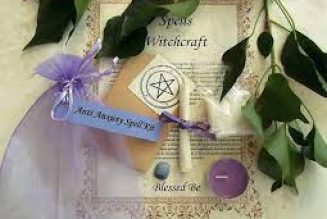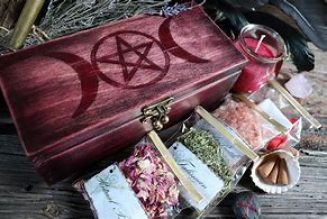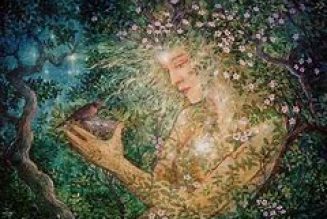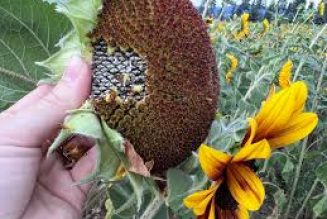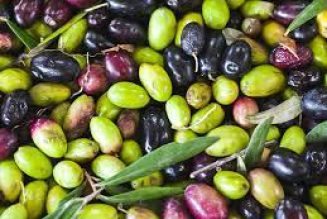The brewing of magickal potions is a traditional skill of witches.
Images of the cackling witches in Macbeth might come to mind, with their bubbling cauldron and horrible potion ingredients, or one may think of Cerridwen, whose legendary potion had to brew for a year in order to yield three drops of magickal elixir—but in reality, potions can be made quickly, simply, and from ordinary ingredients.
Tea is inherently magickal because it incorporates all four elements:
boiling water (Fire and Water),
herbs (Earth), and
aromatic steam (Air).
To make any cup of tea with magickal intent is to brew a potion.
To drink a potion is to cast an in drinking spell, as you draw the magickal power of the brew into yourself.
The potions given here are simple spells that can be cast at any time.
They are best made in privacy when you are calm, centered, and feeling able to enchant the potion with the power of your intent.
You could use these potions when you have specific needs, or you could use one or more of them on a regular basis to maintain positive conditions in your life.
As with all magick, the more energy and effort that you put into a spell, the better the result that you will obtain from it.
Whenever possible in making and drinking these potions, do use your finest china, your best table linens, your good silverware, and so on.
If you use the potions regularly, make a small ceremony of their preparation.
Such rituals are comforting.
They center you and make life more meaningful.
Rituals also encourage the flow of magick through you and throughout your life.
Recipes for many different potions are given here. They are all meant to be made by you for yourself.
It is unethical to administer a potion to someone without that person’s knowledge and informed consent.
To violate someone in that way is to invite negative repercussions to rebound upon you, so you definitely don’t want to start brewing up
potions and serving them to people who have no idea what they are drinking.
Each of these potions is designed to draw specific positive energies toward you.
You can prepare them however you usually make tea, such as with milk and sugar.
Be sure to only stir them deosil though, because you are working to attract those vibrations that will help you to achieve your objective.
Some of the potions call for symbols such as hearts and runes to be stirred into them.
First stir those potions deosil, then stir the shape of the symbol into them.
It’s fine if you would prefer to use an alternate symbol, such as a different rune. Be sure to focus on your magickal objective while you drink the potions.
The Spell
A potion spell, like any other spell, begins when you first think about making it.
The next step is to gather everything that you need to make the potion.
As you do this, focus your magickal attention on the effect that you want your potion to have.
Visualize the changes that you would like the potion to manifest in you and in the circumstances of your
life.
Get into a magickal mood when you are ready to make the potion.
Create sacred space in the place where you will make it and in the place where you will drink it.
Empty your kettle of any standing water, and fill it with fresh water.
Heat the kettle until the water is at a full boil, with steam pouring from the spout.
Regard the boiling kettle and say:
Powers of Water, Powers of Fire,
Bring to me what I desire.
Put the herbs in the pot, or the tea bag(s) into the cup, and
pour the boiling water over them. Allow the brew to steep
for a bit. Inhale its steam, and say:
Powers of Earth, Powers of Air,
Draw to me all that is fair.
Remove the tea bag(s), or pour the tea from the pot into a cup.
Raise power.
Hold your hands over the cup for a moment, as you focus on infusing the potion with your magickal intent.
This is the most important part of the spell, so use full power and give it your complete attention.
Stir the tea and say:
This cup of tea is now enchanted,
with seeds of ________,
firmly planted.
Aromatic magickal potion,
As I drink, set my spell in motion.
Ingredients
water:
Ordinary tap water is fine, but spring water or filtered water is preferable.
If you become very interested in making tea potions, you may want to begin collecting water from natural sources, such as rain water, melted snow, or water from wells, streams, or springs to use in your potions.
If you do this, be sure to only use water that you are certain is safe to drink.
tea:
When black tea is specified, it means ordinary tea, such as orange pekoe.
Lemon balm tea means Melissa of icinalis, which is also simply called balm.
Ginger tea means tea that is brewed from a piece of freshly peeled ginger root;
cinnamon tea means tea that is brewed from cinnamon sticks or chips.
Rose tea means tea that is made from rose petals, rose hips, or a combination of the two.
When a potion calls for more than one kind of tea, you can use two tea bags in the cup, or a spoonful of each herb, per cup of tea, in the pot.
You may find it easier to obtain commercial tea products, such as cinnamon tea or ginger tea.
If so, try to use those products that contain natural ingredients.
Dong quai, cat’s claw, eyebright, feverfew, scullcap, uva ursi . . . there are esoteric herbs that can be used in tea potions, but this book’s recipes focus on ingredients that are generally readily available in grocery stores.
sweetener:
Honey has the magickal power of attraction, so it is the ideal sweetener to use in tea potions.
Ginger has many magickal qualities, so pieces of candied ginger also make good sweeteners for the potions.
You could also use sugar, or no sweetener at all.
Artificial sweeteners have no magick in them, but you can use themif you need to.
citrus:
Lemon has the magickal powers of repelling and averting, so it is best not to use lemon in any of these potions unless it is listed as an ingredient.
When lemon is called for, that is because it has a magickal correspondence with the potion’s intent.
In that case you can use a strip of lemon peel or a squeeze of fresh lemon juice.
When the peel of any citrus fruit is called for, it means the zest, the colorful outer part of the skin of the fruit.
Citrus peel may be used fresh or dried.
Milk should not be added to potions that contain citrus, because it is likely to curdle.
other ingredients:
When a potion calls for a crystal or other stone, you place it in the cup with the tea, but you DO NOT INGEST IT!
You wash the stone after you drink the tea, and reserve it for future use.
When a potion requires a cinnamon stick, you use it to stir the tea, then discard it after drinking the potion.
The Potions
Taste is individual, so it is unlikely that you will care for all of these potions.
Do not use a potion whose taste you really dislike or one that contains an ingredient you are allergic to.
Wherever possible, more than one recipe is given.
Feel free to experiment, and create your own potions.
